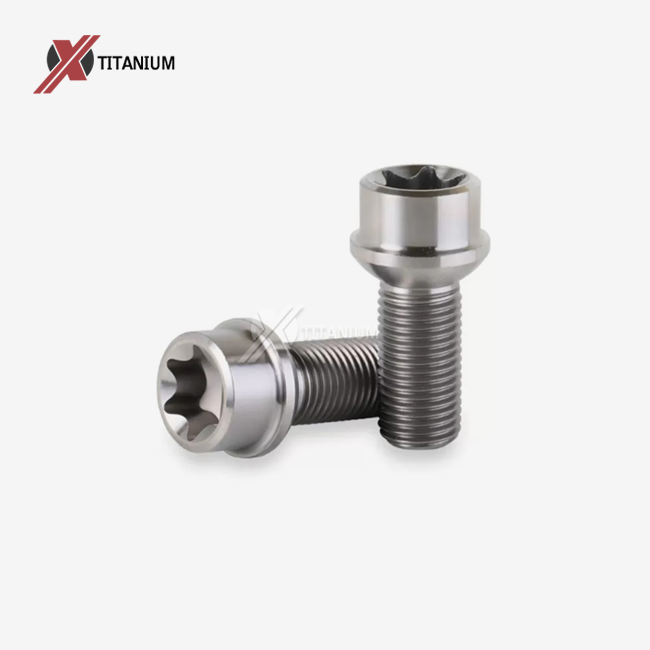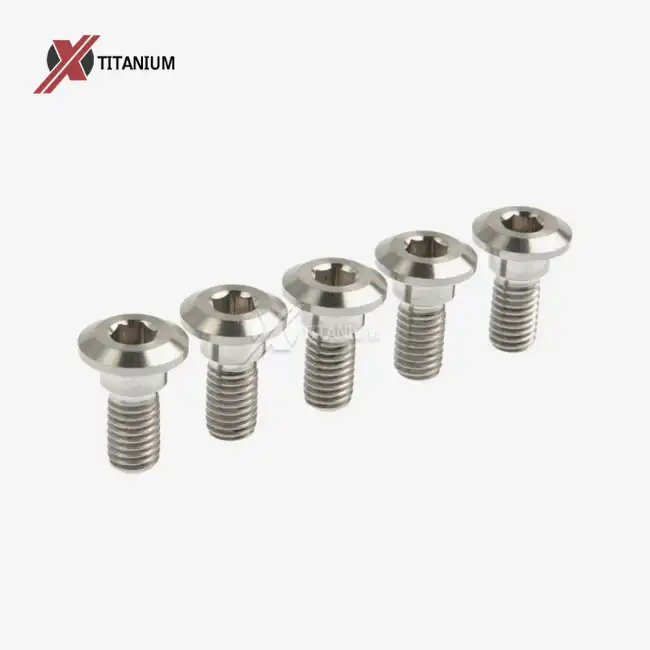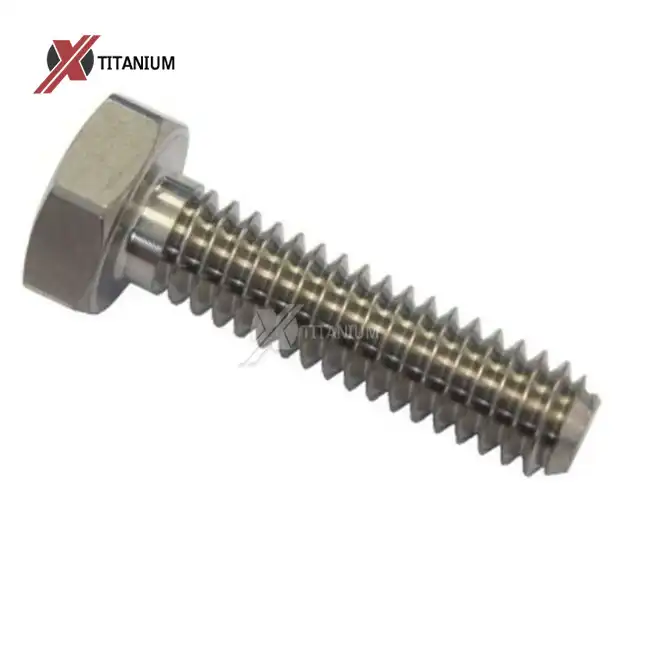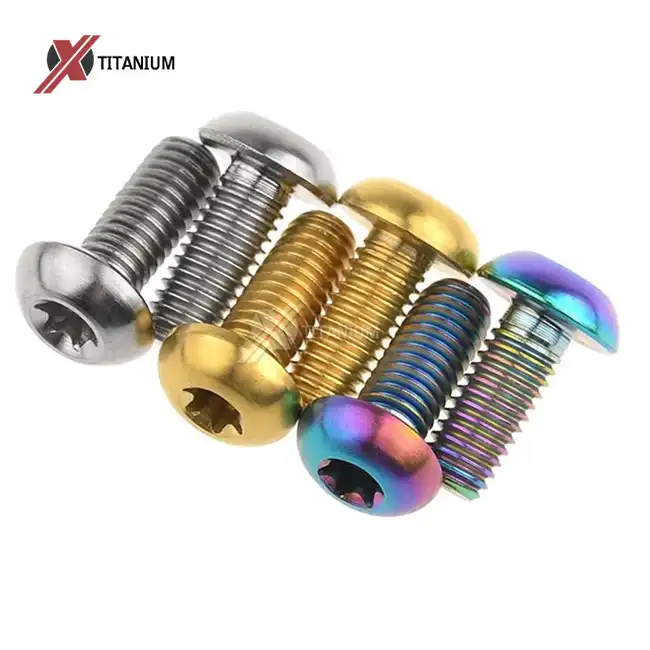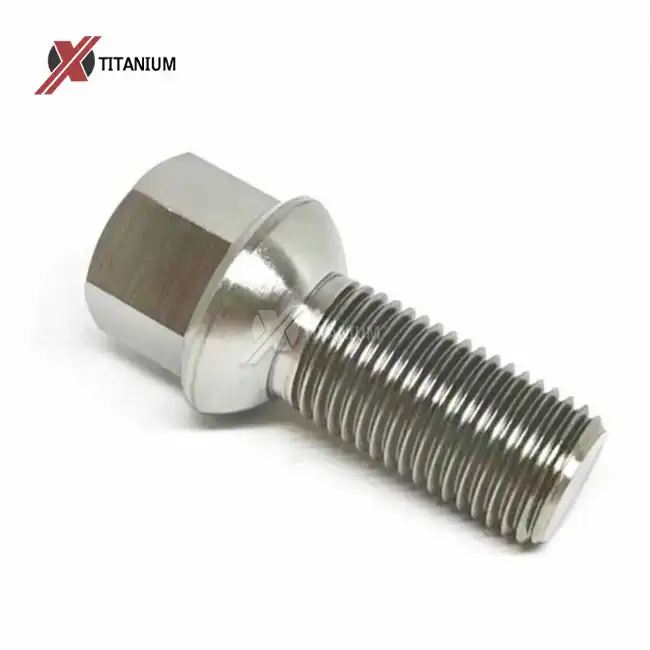The Engineering Marvel of Titanium Wheel Lug Bolts
Material Composition and Properties
Titanium wheel lug bolts are crafted from Ti-6Al-4V (Grade 5) titanium alloy, a material renowned for its exceptional strength and lightweight characteristics. This alloy combines titanium with 6% aluminum and 4% vanadium, resulting in a fastener that boasts a remarkable tensile strength of 950-1050 MPa and a shear strength of 600 MPa. These values surpass those of traditional steel bolts, ensuring that titanium lug bolts can withstand the immense forces exerted during vehicle operation.
The unique properties of titanium alloy contribute significantly to the performance of these wheel lug bolts. With a hardness rating of 35-40 HRC, they resist deformation and wear, maintaining their structural integrity over extended periods. This hardness, combined with titanium's inherent resistance to corrosion, makes these bolts exceptionally durable in various environmental conditions, from coastal areas with high salt content to regions with extreme temperature fluctuations.
Design Innovations for Enhanced Performance
The design of titanium wheel lug bolts incorporates several innovative features that further enhance their performance and safety benefits. Manufacturers offer various head types, including hexagonal, Torx socket, and customized anti-theft pentagon designs. These options not only provide flexibility for different vehicle specifications but also offer increased security against theft.
The seat type of the bolt, typically a 60-degree cone or ball seat, ensures optimal contact with the wheel, distributing force evenly and preventing loosening. This design consideration is crucial for maintaining proper wheel alignment and preventing vibration-induced wear.
Additionally, the thread design of titanium wheel lug bolts is optimized for secure fastening. Common thread sizes include M12x1.25mm, M12x1.5mm, and M14x1.5mm, catering to a wide range of vehicle makes and models. The precision machining of these threads, combined with titanium's anti-seizing properties, facilitates smooth installation and removal while maintaining a secure fit over time.
Safety Advantages of Titanium Wheel Lug Bolts
Unparalleled Strength and Durability
The exceptional strength of titanium wheel lug bolts translates directly into enhanced vehicle safety. These bolts can withstand higher loads without deformation or fatigue failure compared to traditional steel bolts. This resilience is particularly crucial in high-stress scenarios such as aggressive cornering, sudden braking, or off-road driving, where the forces acting on wheel attachments are amplified.
Moreover, the fatigue resistance of titanium alloy ensures that the bolts maintain their structural integrity over numerous stress cycles. This characteristic is vital for long-term safety, as it significantly reduces the risk of bolt failure due to metal fatigue, a common concern with lower-quality fasteners.
Corrosion Resistance for Longevity
Titanium's innate resistance to corrosion plays a pivotal role in maintaining vehicle safety over time. Unlike steel bolts that may corrode when exposed to road salts, moisture, and other corrosive elements, titanium wheel lug bolts remain virtually impervious to these threats. This corrosion resistance ensures that the bolts maintain their strength and structural integrity throughout their lifespan, reducing the risk of unexpected failures due to weakened or compromised fasteners.
The longevity afforded by corrosion resistance also means that titanium wheel lug bolts require less frequent replacement, ensuring consistent safety performance and reducing the likelihood of improper installation or overtightening that can occur during frequent bolt changes.
Weight Reduction and Its Impact on Vehicle Dynamics
One of the most significant safety advantages of titanium wheel lug bolts lies in their contribution to weight reduction. Titanium's low density allows these bolts to weigh significantly less than their steel counterparts, typically offering a weight savings of up to 40-50%. This reduction in unsprung mass has a profound impact on vehicle dynamics.
Reduced wheel weight improves suspension responsiveness, allowing the wheels to react more quickly to road irregularities. This enhanced responsiveness translates to better tire contact with the road surface, improving overall traction and handling. In emergency maneuvers, such as sudden lane changes or evasive actions, this improved handling can make a critical difference in avoiding accidents.
Furthermore, the reduction in rotational mass afforded by lighter wheel assemblies can improve acceleration and braking performance. In performance driving scenarios, this can contribute to more precise vehicle control, further enhancing safety margins.
Applications and Considerations for Titanium Wheel Lug Bolts
Ideal Use Cases and Vehicle Types
Titanium wheel lug bolts find their most prominent applications in high-performance and luxury vehicles where every aspect of engineering is optimized for peak performance and safety. Sports cars, racing vehicles, and premium automobiles from manufacturers such as Porsche, BMW, Tesla, Ferrari, Mercedes, and Audi often utilize these advanced fasteners to enhance their vehicles' capabilities.
In motorsports, where every gram of weight reduction can translate to improved lap times, titanium wheel lug bolts are practically indispensable. The combination of strength, light weight, and resistance to extreme temperatures makes them ideal for the rigorous demands of competitive racing.
However, the benefits of titanium wheel lug bolts are not limited to high-end vehicles. Performance enthusiasts and safety-conscious drivers across various vehicle segments can upgrade to these premium fasteners to enhance their vehicle's safety and performance characteristics.
Installation and Maintenance Considerations
While titanium wheel lug bolts offer numerous advantages, proper installation and maintenance are crucial to fully realize their safety benefits. It's essential to follow manufacturer-specified torque settings when installing these bolts, as their unique material properties may require different torque values compared to standard steel bolts.
The use of specialized tools, such as torque wrenches calibrated for titanium fasteners, is recommended to ensure accurate tightening. Over-tightening can lead to bolt stretching or thread damage, while under-tightening may result in loosening during operation. Some titanium wheel lug bolts feature Torx or other specialized head designs, requiring specific tools for installation and removal.
Regular inspection of titanium wheel lug bolts is advisable, despite their durability. While they resist corrosion and wear better than steel bolts, periodic checks can identify any potential issues early on, ensuring continued optimal performance and safety.
Cost-Benefit Analysis for Vehicle Owners
The decision to upgrade to titanium wheel lug bolts involves weighing their premium cost against the long-term benefits they offer. While the initial investment is higher compared to standard steel bolts, the extended lifespan, reduced maintenance requirements, and enhanced safety features often justify the expense for many vehicle owners.
For execution devotees and proprietors of high-end vehicles, the weight decrease and moved forward vehicle elements can give substantial benefits in terms of dealing with and by and large driving encounter. In hustling applications, the execution picks up can be indeed more critical, possibly offsetting the fetched through made strides competitiveness.
Moreover, the peace of intellect that comes with knowing your vehicle is prepared with top-tier security components is priceless for numerous drivers. The decreased hazard of jolt disappointment, moved forward erosion resistance, and potential for improved vehicle control in basic circumstances contribute to an in general more secure driving involvement.
Conclusion
Titanium wheel lug bolts represent a significant advancement in automotive safety technology. Their unique combination of strength, light weight, and durability addresses critical aspects of wheel attachment security and vehicle dynamics. By enhancing the reliability of wheel fastening, reducing unsprung weight, and improving overall vehicle handling, these innovative components contribute to a safer driving experience across various driving conditions.
As automotive technology continues to evolve, the role of advanced materials like titanium in enhancing vehicle safety becomes increasingly prominent. For vehicle owners prioritizing safety, performance, and longevity, titanium wheel lug bolts offer a compelling upgrade option that aligns with these goals.
For more information about titanium wheel lug bolts and other high-performance titanium products, please contact Baoji Chuanglian New Metal Material Co., Ltd. at info@cltifastener.com or djy6580@aliyun.com. Our team of experts is ready to assist you in finding the perfect titanium solutions for your automotive needs, ensuring you can experience the pinnacle of safety and performance on the road.
